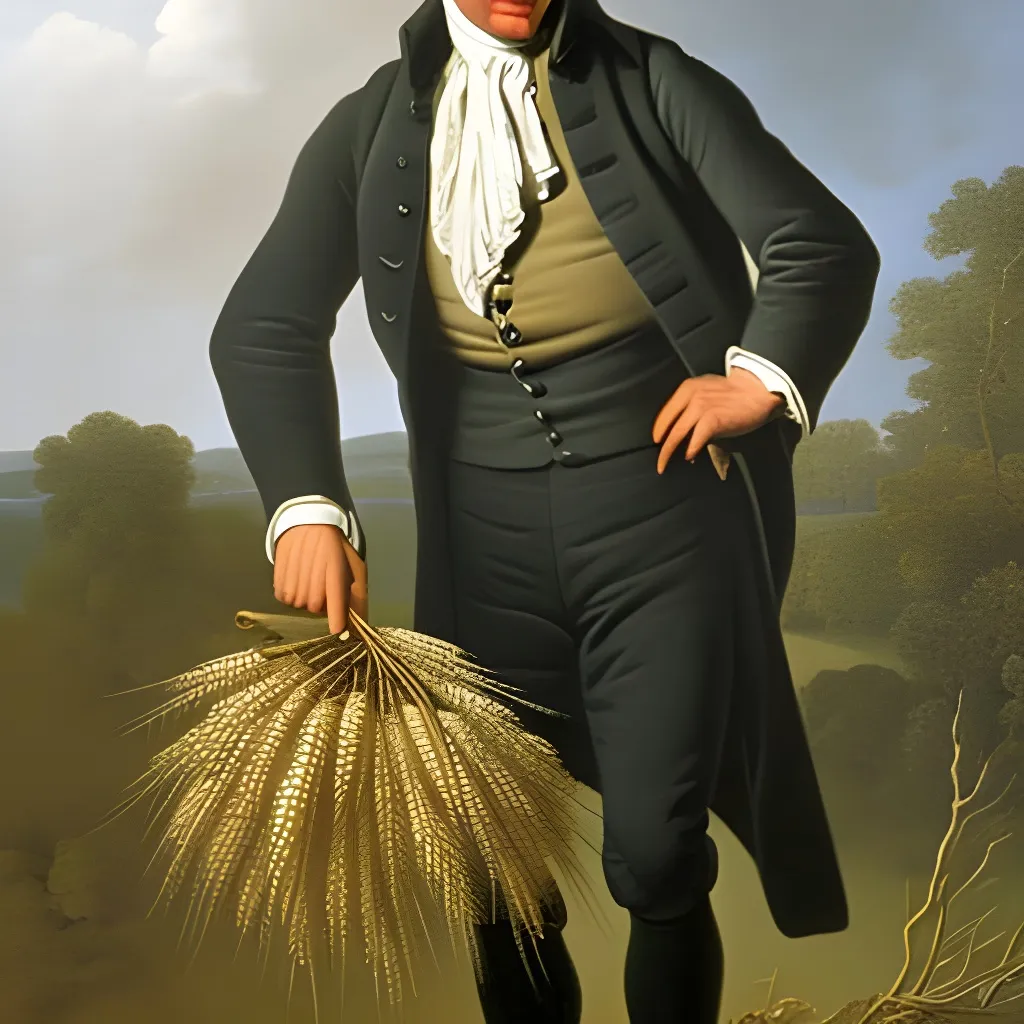
The above image was made with stable diffusion using the prompt 'Thomas Paine and a bushel of wheat.'
Thomas Paine published Agrarian Justice in 1795. Many of its ideas have withstood the test of time. Perhaps the most important is its division of property into two types. The first type is the natural world and its bounty, to which we're all entitled an equal share. The second type is the artificial improvement upon this common property to increase its productivity and support denser populations. Paine observed that the second type of property, possessed by relatively few landowners, made it impossible for everybody else to access their fair share of the first type of property. To remedy the inequity, Paine proposed:
To create a National Fund, out of which there shall be paid to every person, when arrived at the age of twenty one years, the sum of fifteen pounds sterling, as a compensation in part, for the loss of his or her natural inheritance, by the introduction of the system of landed property: And also, the sum of ten pounds per annum, during life, to every person now living, of the age of fifty years, and to all others as they shall arrive at that age.
This is the earliest example of a proposed Universal Basic Income that I'm aware of. Paine suggested funding it with property tax, reasoning that property owners were responsible for making natural resources inaccessible to those who didn't own property. Not knowing the economics of the era, I'm not sure how workable this UBI really would've been. But it is telling that it was never adopted.
In my opinion, Paine's rationale for the UBI is of more value than the UBI itself. We all naturally have an equal right to a share of the world's resources, yet the world has been not been divided up that way. Rather, it's been divided up according to a private ownership scheme. No matter what any piece of paper says, the land and water and air belong to all of us by natural right. We may observe the rules of the artificial scheme to maintain civility. Or we may suffer under the tyrannies of those charged with enforcing these rules.
Either way, we accept a reality where our natural rights cannot be asserted. That's not ideal. At this point, I get the impression that many people are genuinely unaware that they even have natural rights. Sadly, many probably don't have rights in practical terms.
This is part of why I write so much about natural freedoms. I used to use the language of sovereignty more but feel like the Sovereign Citizens movement has poisoned this language with their frivolous lawsuits and fake legal proceedings. Now I talk about freedom and the blues think I'm a red.
To my way of thinking, every freedom is tied to obligations. We're free biologically, with the right to use resources and the obligation to protect our ecosystems from harm. Society locks this right in a cage that can only be opened with keys made of money and programs us to forget about this obligation.
What Thomas Paine did in his time was to assert that everyone had the right to exist, with all that entails. We all deserve to exist, and yes, the world does owe us a living. If civilization is getting in the way of that, we'd be wise to remedy the situation amicably. That seems important to recognize in an era increasingly dominated by individualistic voices devoid of social responsibility.
Read my novels:
- Small Gods of Time Travel is available as a web book on IPFS and as a 41 piece Tezos NFT collection on Objkt.
- The Paradise Anomaly is available in print via Blurb and for Kindle on Amazon.
- Psychic Avalanche is available in print via Blurb and for Kindle on Amazon.
- One Man Embassy is available in print via Blurb and for Kindle on Amazon.
- Flying Saucer Shenanigans is available in print via Blurb and for Kindle on Amazon.
- Rainbow Lullaby is available in print via Blurb and for Kindle on Amazon.
- The Ostermann Method is available in print via Blurb and for Kindle on Amazon.
- Blue Dragon Mississippi is available in print via Blurb and for Kindle on Amazon.
See my NFTs:
- Small Gods of Time Travel is a 41 piece Tezos NFT collection on Objkt that goes with my book by the same name.
- History and the Machine is a 20 piece Tezos NFT collection on Objkt based on my series of oil paintings of interesting people from history.
- Artifacts of Mind Control is a 15 piece Tezos NFT collection on Objkt based on declassified CIA documents from the MKULTRA program.